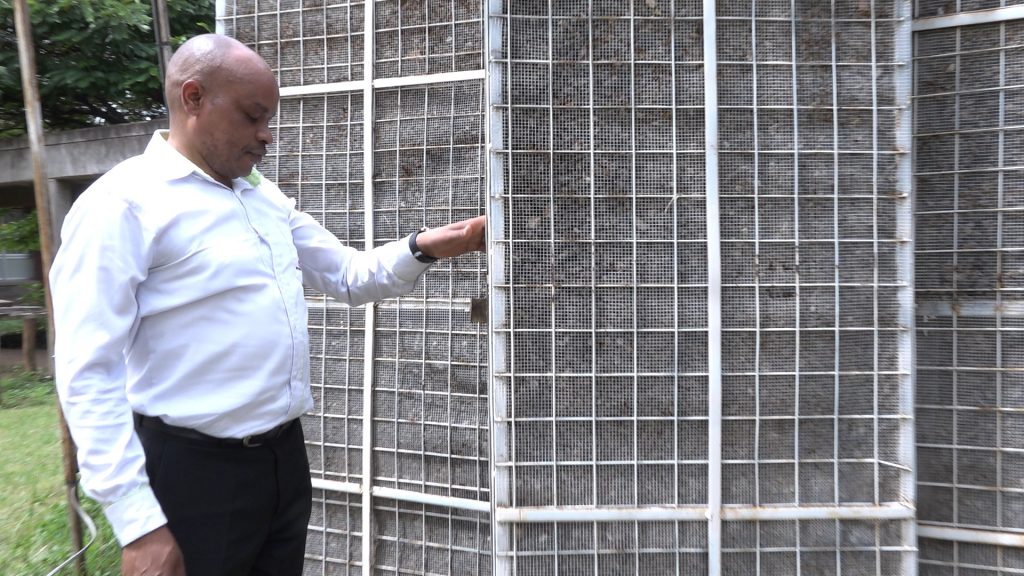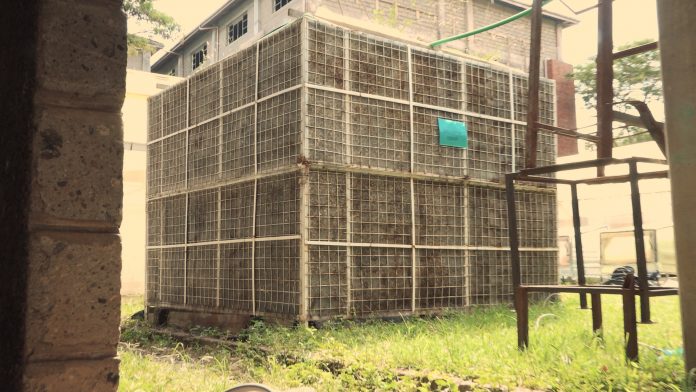Elias Waweru, a master’s student at the Jomo Kenyatta University of Agriculture and Technology (Jkuat) has come up with a solar-powered cooler for preserving perishable foodstuffs.
His Zero Energy Cooler is designed to preserve foodstuff and fruits with the overriding goal being to help households cut on food spoilage and wastage while saving farmers post-harvest losses in hot areas.
Unlike traditional refrigeration, the cooler box has zero carbon emission.

“The concept behind the cooler is evaporative cooling – when water evaporates, it sucks heat energy from the surrounding environment, the same way sweating works. When you sweat your body cools down. So in this case, the evaporation causes cooling in the coolers’ chambers,” said Waweru in an interview.
Kales, for instance, can stay fresh in the cooler for a period of seven days, according to the innovator.
The cooler box is made of a wall of wire mesh filled with pumice rocks. Above the wall of the box are perforated pipes dripping with water that is sucked by the porous pumice. It’s the water that’s trapped in the pumice that leaves a cooling effect when it evaporates, he explains.
The excess water that seeps through the pumice rocks to the bottom is stored in a reservoir. After the reservoir fills up the water is then pumped up using a solar pump back to the perforated pipes creating a cycle. This means the same water is used over and over, making it renewable and highly suitable for hot regions with water challenges.
Besides the evaporation cooling concept, the cooler also works through transpiration cooling effect. This is because crops could be grown on top of the box and when they transpire, evaporation takes place, bringing about a cooling effect in the chambers below.
At the same time, the water collected in the reservoir at the bottom is fanned into the cooler enhancing coolness in the chamber, working more or less like conventional cooling.
Waweru says the project has been piloted in Makueni County, being a semi-arid area.
He says that the cooler could be a timely package for greenhouses farming.
Carbon-free
“Normal fridges commonly in use in homes, restaurants and stores, are not really environmentally friendly. They emit harmful gases that pollute the ozone layer. Also, the alternative charcoal coolers lead to deforestation, posing a threat to the environment. But with this zero energy cooler, the fact that it uses pumice as its main element, it’s much more environmentally-friendly,” said Waweru.
Also, the solar-powered cooler is a knock-down system, meaning one can easily take it apart and rebuild it again, making it friendly during transportation.
Target Audience
Waweru says his target audience is county governments in semi-arid agricultural areas, like Ukambani, along with farmers, both large scale and small scale.
“One of the main challenges farmers face when it comes to their harvest is getting it to the market, sometimes over a long distance, without it getting spoiled. The county governments can purchase this cooler in various counties in order to store various products before and after transportation to maintain healthy foods for consumers and farmers,” he said.
Challenge
He says a big challenge is sourcing the pumice rocks since they can only be found in Rift Valley.



